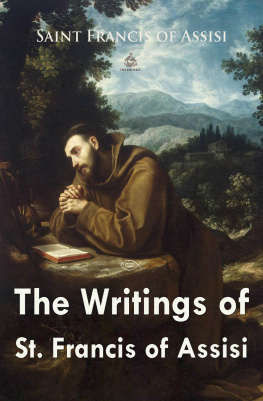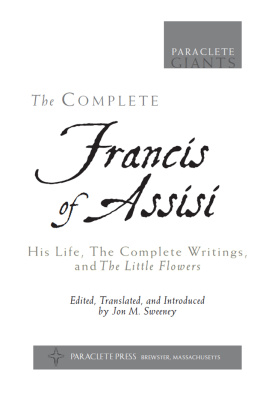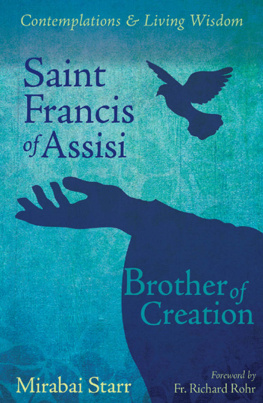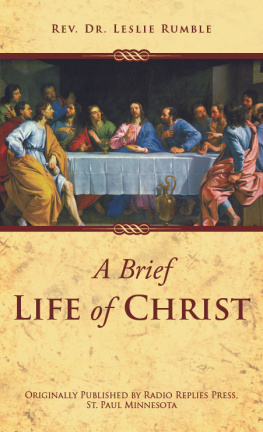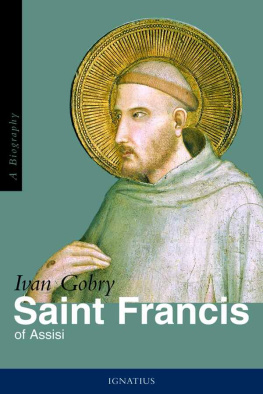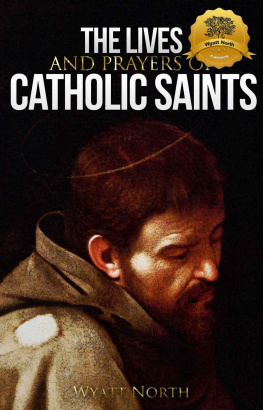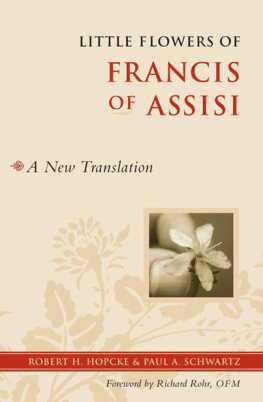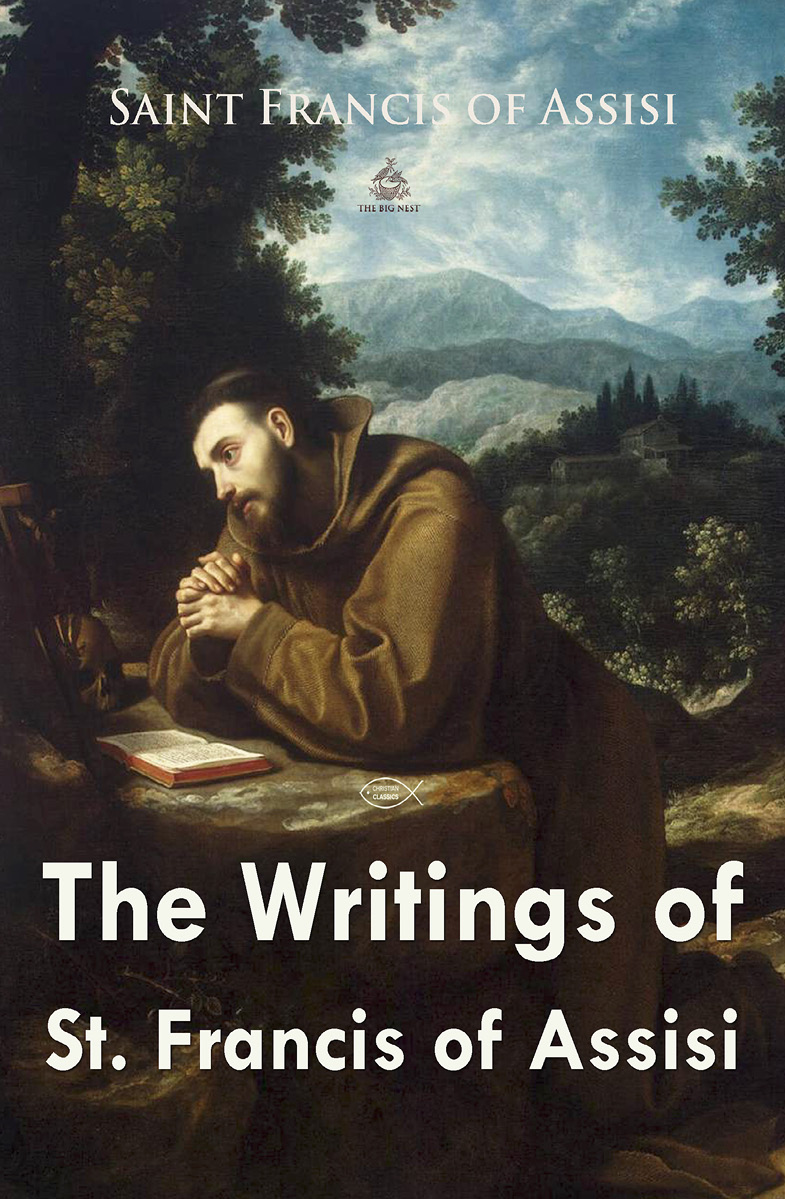

Saint Francis of Assisi
The Writings of St. Francis of Assisi

Christian Classics





THE BIG NEST
LONDON NEW YORK TORONTO SAO PAULO MOSCOW
PARIS MADRID BERLIN ROME MEXICO CITY MUMBAI SEOUL DOHA
TOKYO SYDNEY CAPE TOWN AUCKLAND BEIJING
New Edition
Published by The Big Nest
www.thebignest.co.uk
This Edition first published in 2016
Copyright 2016 The Big Nest
Images and Illustrations 2016 Stocklibrary.org
All Rights Reserved.
ISBN: 9781911535447
Contents
Introduction
I.
THE writings of St. Francis may, as is obvious, be considered from more than one point of view. Premising this, we are afforded a clue to the difficulty which has led students of Franciscan sources to divide themselves into two camps as to the objective value of these writings. Indeed, one writer goes so far as to compare the attitude of modern scholars toward them to that of the Spiritual and Conventual Friars respectively in the first century of Franciscan history. For while one party, led by M. Paul Sabatier, attaches what some regard as almost undue weight to the writings of St. Francis as a source of our knowledge of him, the other party, following Mgr. Faloci Pulignani, displays, we are told, a tendency to belittle their importance. The truth is, as Professor Mller long ago pointed out, that these writings afford us little if any information as to the life of their author, a fact which may perhaps account for their comparative neglect by so many of the Saints biographers, but it is not less true that they bear the stamp of his personality and reflect his spirit even more faithfully than the Legends written down on the very morrow of his death by those who had known him the best of all. For this reason they are well worth all the serious study that scholars outside the Franciscan Order are now beginning to give to them.
To say that the writings of St. Francis reflect his personality and his spirit is but another way of saying that they are at once formidably mystic and exquisitely human; that they combine great elevation of thought with much picturesqueness of expression. This twofold element, which found its development later on in the prose of mystics like St. Bonaventure and in the verse of poets like Jacopone da Todi, and which has ever been a marked characteristic of Franciscan ascetic literature, leads back to the writings of the Founder as to the humble upper waters of a mighty stream. St. Francis had the soul of an ascetic and the heart of a poet. His unbounded faith had an almost lyric sweetness about it; his deep sense of the spiritual is often clothed with the character of romance. This intimate union of the supernatural and the natural is nowhere more strikingly manifested than in the writings of St. Francis, which, after the vicissitudes of well nigh seven hundred winters, are still fragrant with the fragrance of the Seraphic springtide.
Important as the doctrinal aspect of St. Francis writings must of necessity be to all who would understand his lifesince the springs of action are to be found in belief, and conduct ultimately rests upon conviction it is foreign to the object of the present volume. I am here concerned with the literary and historical aspect of these writings. Suffice it to say that St. Francis doctrine, which received, so to speak, the Divine Imprimatur upon the heights of La Verna two years before his death, is nothing more or less than a paraphrase of the Sermon on the Mount. Nowhere can there be found a simpler literalness in the following of the poverty, humility, and holy Gospel of the Lord Jesus than in the writings of St. Francis, and any attempt to read into them the peculiar doctrines of the Abbot Joachim of Flora, the Humiliati, the Poor Men of Lyons, or any of their nameless followers, is as unjust as it is unjustifiable. Needless to add that St. Francis writings contain no new message. Indeed, the frequency with which certain very old and familiar aspects of the eternal truths are insisted upon by St. Francis in season and out of season, is not unlikely to weary the average reader who does not pause to look between the lines. This tendency to repeat himself, which is habitual with St. Francis, does not necessarily bespeak any dearth of ideas. On the contrary. His simple, childlike nature fastened upon three or four leading thoughts taken from the words of the Lord, which seemed to him all-sufficing, and these he works into his writings over and over, tempering them to the needs of the different classes he addresses as he understood them. If then we recall the circumstances under which St. Francis wrote and the condition of those for whom his writings were intended in the first instance, far from being bored, we may gain something from each new repetition.
Because St. Francis loved Jesus and His Eucharistic Passion, ardently, enthusiastically, almost desperatelyto borrow Bossuets adjectiveshis sympathy extended to every creature that suffered or rejoiced. His writings are eloquent witnesses to this far-reaching, all-embracing solicitude. They may be said to run over the whole gamut. Witness the soft note touched in the letter to Brother Leo and the deep masculine tone in which the Testament is pitched. On the whole, however, his writings fall naturally under three heads: those, like the Rules, which represent St. Francis as legislator; those, like the Letter to a Minister, which show us St. Francis as a spiritual father; and those, like the Praises and Salutations, in which we see St. Francis as his earliest biographer saw himnot so much a man praying as prayer itself.
It was Matthew Arnold, I believe, who first held St. Francis up to English readers as a literary type a type withal as distinct and formal as the author of the Divine Comedy. But however true a poetand without St. Francis no Danteit is certain that the Poverello was in no sense a man of letters. He was too little acquainted with the laws of composition to advance very far in that direction. His early years had been a bad preparation for study, and he ever remained a comparative stranger to the ecclesiastical and classical learning of his time, though probably his culture was larger than we might be led to conclude from his repeated professions of ignorance and the disparaging remarks of some of his early biographers. Through his mother he seems to have got some acquaintance with French; he received elementary instruction in reading and writing from the priests at San Giorgio, who also taught him enough Latin to enable him to write it in later years after a fashion, and to understand the ritual of the Church and its hymns, which he was wont to sing by the wayside. But in considering St. Francis literary formation, we must reckon largely with the education he picked up in the school of the Troubadours, who at the close of the twelfth century were making for refinement in Italy.The imagery of the c hansons de gestes seems to have exercised an abiding influence upon St. Francis life and writings, as is evident from his own tale of the Lady Poverty, which later inspired the pen of Dante and the brush of Giotto. Witness, too, his frequent allusions to the Knights of the Round Table; his desire that his Friars should become the Lords Jongleurs, and his habit of courtesy extended even to Sister Death. On the other hand St. Francis was nothing if not original. His writings abound not only in allegory and personification, but also in quaint concepts and nave deductions. His final argument is often a text of Holy Scripture, which he uses with a familiarity and freedom altogether remarkable. Indeed there are parts of his writings in which the interweaving of Scriptural phrases is so intricate as almost to defy any attempt to indicate them by references, the more so since the Biblical language adopted by St. Francis is not always taken from the Bible, but often from the Liturgy, Missal, and Breviary. For the rest, as Celano puts it, he left empty ornaments and roundabout methods of speech and everything belonging to pomp and to display to those who are ready to perish; for his part he cared not for the bark, but for the pith; not for the shell, but for the nut; not for the multiple, but for the one only sovereign good.

